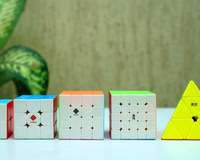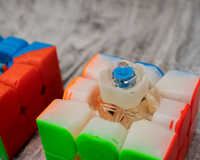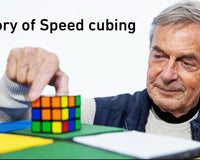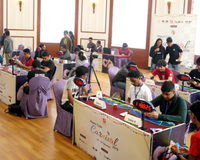Introduction
Improving at speedcubing gets harder at every single stage of improvement. That sentence feels very redundant but it actually holds a deeper meaning behind it. As one gets faster at a puzzle, their scope of getting even faster keeps reducing, to the point where they peak unless they change their approach. It can be tough to even make 0.5-second improvements after a moment and forget 5-6 seconds, which can be very frustrating. The truth is: The better you get, the harder it is to get better.

What Does Getting Better Mean?
Well, there are many aspects of getting better at cubing, but the two main ones are speed and efficiency. Speed is increased by working on your finger tricks as well as lookahead ability and adapting your turning to suit quicker solutions. Efficiency is increased by working on your solutions themselves, often by means of slower solves and critiques, and improving the accuracy of your turning to suit better solutions.
Overall, you get better in these two major aspects and witness a drop in your times that corresponds to this improvement. However, as the graph above has shown, at one point, you may feel at a slight loss in terms of how much you can learn to improve at cubing. This point brings about a bit of demotivation and can be hard to get out of.

The simplest way to solve this issue is by grinding solves. Now, remember that grinding does not involve learning anything new, and so you will have to go back to learning new and more efficient ways of solving eventually. However, grinding does have its own benefits. In case you’re new to the term, ‘grinding’ refers to doing multiple (hundreds, if not more) solves in order to cement your current state in your improvement curve and establish muscle memory.
What Grinding Does To Your Brain
As I just mentioned, you reinforce all the stuff you’ve learned up to that stage by grinding solves, and committing multiple things that you’ve learned to muscle memory. This helps your brain to focus on other things while you solve, such as lookahead and turning accuracy. It’s remarkable how much space you actually free up for improvement just by increasing your muscle memory.
Now, just like a machine that relies on a set of inputs to learn something and make a decision, the brain understands more and more about your turning and solutions with each solve. You are teaching your brain about your solutions and it is invariably learning how to do them with less and less effort each time. This means that your brain develops a sense of autonomy with respect to your solves and you have enough muscle memory after a point to see an increase in speed.

As for your efficiency, that is aided in improvement by the free space in the brain going into observing your solves more critically now that it doesn’t have to focus on your movements actively. You start to realize better ways to solve certain cases and recognize patterns that can be brought about by repetitive solving!
Just like that, your brain has helped you in your improvement, and you will notice jumps in your averages. Again, I’d like to point out that this can’t be used as a cheat code, since you still have to keep learning new things and implement them in order to make more significant leaps in improvement, but combining the two in the right amount is what makes one a well-rounded speedcuber.
An Underrated Advantage
As we know, learning new algorithms on a puzzle is hard and takes a huge amount of motivation to do. The funny thing is that grinding actually helps you learn new algorithms, simply by means of repeating them, whether independently or within solves. This helps you commit them to short-term muscle memory, which you can then extend to long-term muscle memory by doing multiple solves.
An Unfortunate Disadvantage
It isn’t all strawberries and sunshine when it comes to this technique and naturally, there is a drawback. The idea of grinding is to reinforce everything that you do while solving in order to make them second nature to you. However, this means that even the bad habits (that everyone ends up developing a few of) also become cemented into your general solving.

This is extremely bad because you end up thinking that some inefficiencies are not mistakes and believe that you’re doing the right things, when in fact you are learning the worse ways to perform some parts of the solves, which is far from ideal. You can solve this issue by watching as many solves by better cubers as you can, to understand what makes them so fast!
Conclusion
You can make use of grinding to your benefit when you need to gain some solidity in your solving. It can be a huge boon to your improvement and all that you have to do is avoid the bane which is reinforcing bad habits. As long as you do that, you will continue to reap the benefits of grinding, giving you more motivation and drive to keep going!

Solve Analysis By Akshaansh Chilakapati
I conclude by quoting the famous music YouTuber Adam Neely, who always emphasizes that “repetition legitimizes”. Apply this to anything that is positive and you will always end up on the better side. So what are you waiting for?? Get grinding and get better in no time!
About Author

Akshaansh Chilakapati is a speedcuber from Hyderabad who specializes in big cubes. He started cubing when he was 15 and has 6 years of cubing experience. He loves to play sports, and music and has a passion for astrophysics. He has attended 23 competitions and won a total of 71 podiums with 19 gold medals. He was also ranked 7th in India for the overall Sum of Ranks (SOR).
































